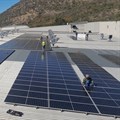
Electricity Minister Kgosientsho Ramokgopa. Source: Siphiwe Sibeko/Reuters
The main issue is rather that Eskom’s current generation equipment is not designed to handle sudden fluctuations in the transmission network. For example, if a solar unit produces 1MW of electricity and there is a sudden drop in solar production for any reason, the utility’s generation equipment must account for that drop – which could exceed the current generation capacity. In other words, the problem does not lie with solar, but rather lack of advanced grid management and demand response systems to ensure stability.
Ramokgopa further failed to clarify whether his statement specifically addresses large-scale energy farms or whether individual business and residential solar are included in his concerns.
Advanced grid management technologies available
In either case, it seems that he may have failed to account for the existence of advanced grid management technologies and modern lithium-ion batteries, which are known for their high energy density, long cycle life and low maintenance requirements.
These batteries store surplus energy from solar panels for use during load shedding, nighttime, and low solar production. Homeowners can tap into grid energy when the supply is stable and seamlessly switch to battery power during blackouts without impacting the grid. Solar systems typically have the capability to control and stagger charge or throttle the amount of power that can be used from the grid to charge the batteries. This can mitigate the risk of high and rapid changes that the utility would have to account for.
Normally, national grids incorporate various measures to maintain stability, regardless of the energy sources connected to them. These measures include voltage regulation, frequency control, and robust transmission infrastructure. Grid operators continually monitor the grid's performance and adjust power generation and distribution to ensure stability. With the increasing integration of solar systems, grid operators have enhanced their capabilities to manage the intermittent nature of solar power. Advanced forecasting techniques, demand response programmes, and energy storage systems further assist in maintaining grid stability.
Concerns about abrupt additions to grid unfounded
The minister’s concerns about abruptly adding a significant amount of solar generation into the grid are also unfounded. The process will more likely follow a staggered implementation approach over multiple years. Large-scale solar projects require months to construct, and the planning, and permit application and allocation phases can take up to three to five years to complete. As a result, the national grid won’t experience a sudden surge of solar energy for several more years, at the very least. This should give the utility ample time to enhance their infrastructure to be ready for solar.
That notwithstanding, solar energy installations, on an individual or national level, can also be deployed in a modular and scalable manner. This allows for gradual additions of solar capacity for better management and integration with the grid. By carefully planning this expansion, the government can ensure that infrastructure keeps pace with growth, avoiding suddenly overloading the grid.
Ultimately, the minister’s remarks remind us of the critical need to upgrade and reinforce the country’s current power infrastructure. By allocating funds specifically for grid improvements and prioritising infrastructure development, the government can address any potential challenges raised as a result of adding greater generation capabilities to the existing grid.








































